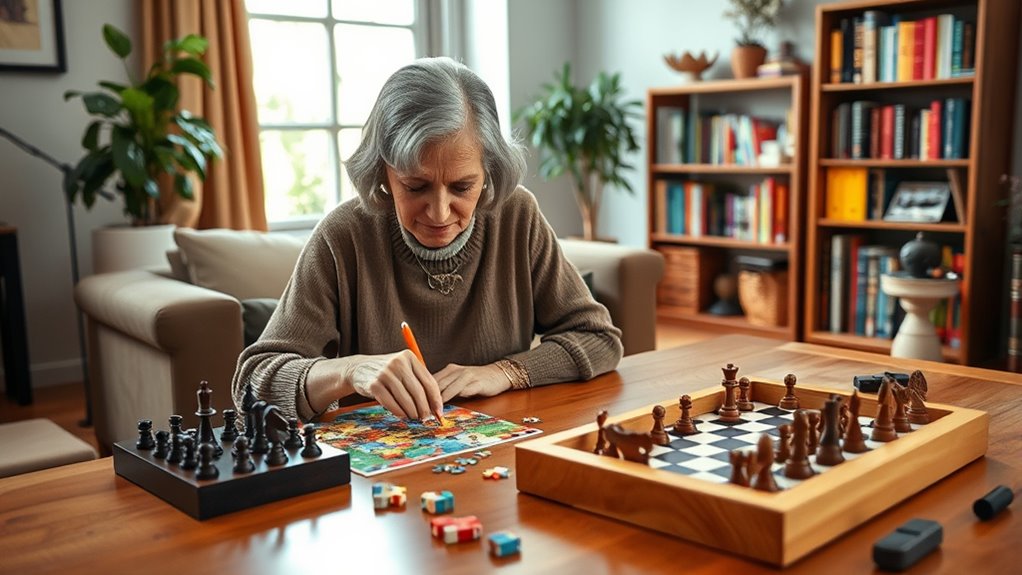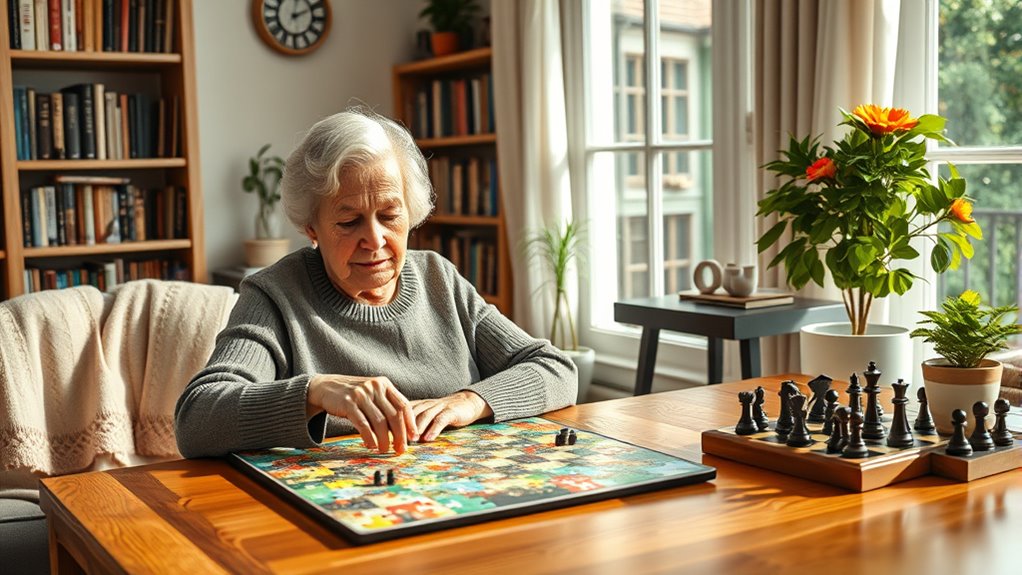To keep seniors engaged at home, incorporate activities like puzzles, crosswords, and memory exercises, which boost cognitive skills and mood. Encourage daily mental workouts through games, memorization, and visualization techniques to strengthen neural pathways. Mindfulness and routine make these practices more effective. Stay flexible and adapt activities to personal interests for lasting engagement. Continuing will reveal more practical ideas to support mental vigor and overall well-being.
Key Takeaways
- Engage seniors with brain games like crosswords, Sudoku, and riddles to enhance problem-solving and social interaction.
- Incorporate memory exercises such as memorizing poems or dates to improve recall and daily functioning.
- Practice mental visualization and mindfulness techniques to boost mental clarity and focus.
- Establish a routine of daily mental activities to maintain cognitive health and resilience.
- Customize activities to personal interests and gradually increase complexity to keep seniors motivated and challenged.

Have you ever wondered how to keep your mind sharp and engaged? Staying mentally active is essential for maintaining cognitive health, especially as you age. One effective way to do this is by incorporating mind-stimulating activities into your daily routine. Brain games and memory exercises are excellent tools that can help you stay alert, improve your thinking skills, and even boost your mood. These activities challenge your brain in a fun and manageable way, making it easier to stay motivated and consistent.
When you start with brain games, you’re giving your mind a workout that can sharpen your problem-solving skills and enhance your concentration. Puzzles like crosswords, Sudoku, and riddles require you to think critically and spot patterns, which can strengthen your neural connections. Card games and board games are also great because they involve strategy, memory, and sometimes even social interaction, all of which stimulate different parts of your brain. The key is to pick activities that you enjoy so that you’re more likely to stick with them over time. Incorporating neural pathways through these exercises can further support brain health and resilience.
Memory exercises are another powerful tool for keeping your mind agile. These exercises push your brain to strengthen memory pathways, helping you recall information more efficiently. You might try simple activities like memorizing a short poem, a list of words, or important dates. As you practice, you’ll notice improvements in your ability to remember details, which can translate into better everyday functioning. Engaging in mental visualization, such as picturing a familiar place or retracing your steps mentally, also helps reinforce your memory. Consistency in practice is vital—set aside a few minutes each day to work on these exercises, and you’ll gradually see progress. Additionally, integrating mindfulness techniques can further enhance your focus and mental clarity during these activities. Exploring cognitive training methods can further optimize your mental engagement and keep your brain resilient over time.
Frequently Asked Questions
How Can Family Members Best Support Seniors’ Cognitive Activities?
You can support seniors’ cognitive activities by encouraging them to engage in memory games and artistic pursuits regularly. Join them in these activities to make it enjoyable, offer gentle guidance, and celebrate their progress. Providing a variety of options keeps their minds active and stimulated. Your involvement boosts their confidence and motivation, helping maintain their mental sharpness and emotional well-being. Active participation truly makes a meaningful difference.
Are There Specific Activities Suited for Seniors With Mobility Issues?
You can support seniors with mobility issues by offering adaptive exercises that suit their abilities, like seated stretching or gentle resistance movements. Sensory games, such as textured fabrics or listening to calming sounds, also stimulate their senses without requiring movement. Focus on activities that are safe and accessible, ensuring they feel engaged and comfortable. Your encouragement and patience make a big difference in helping them stay mentally active.
What Safety Precautions Should Be Taken During At-Home Activities?
This safety question is so important, it’s like guarding a treasure! You should always prioritize home safety by removing tripping hazards and ensuring proper lighting. During activities, supervise closely to prevent accidents, especially for seniors with mobility issues. Keep emergency numbers handy, and use sturdy furniture or supports. By staying vigilant and attentive, you create a safe environment where your loved ones can enjoy engaging activities without worry.
How Often Should Seniors Engage in Mind-Stimulating Activities?
You should encourage seniors to engage in brain training and memory exercises regularly, ideally daily or several times a week, to keep their minds sharp. Consistent activity helps improve cognitive function and maintain mental agility. Incorporate a variety of activities like puzzles, reading, or memory games to keep it interesting. The key is regularity, so they stay mentally stimulated without feeling overwhelmed or fatigued.
Can These Activities Help Delay Cognitive Decline or Dementia?
Engaging in mind-stimulating activities offers significant cognitive benefits, and yes, they can help delay cognitive decline and support dementia prevention. When you actively participate in puzzles, reading, or learning new skills, you strengthen brain connections. This mental engagement keeps your mind sharp longer and may reduce the risk of dementia. So, making these activities a regular part of your routine can have lasting positive effects on your cognitive health.
Conclusion
By engaging in mind-stimulating activities, you have the power to turn your loved one’s daily routine into an exciting adventure that could outshine even the most thrilling roller coaster ride. Imagine opening a treasure trove of memories, sparking endless laughter, and transforming their home into a vibrant hub of activity. Don’t underestimate the impact—these activities could make every day feel like a celebration, ensuring your senior stays sharp, happy, and forever engaged in the wonder of life.









